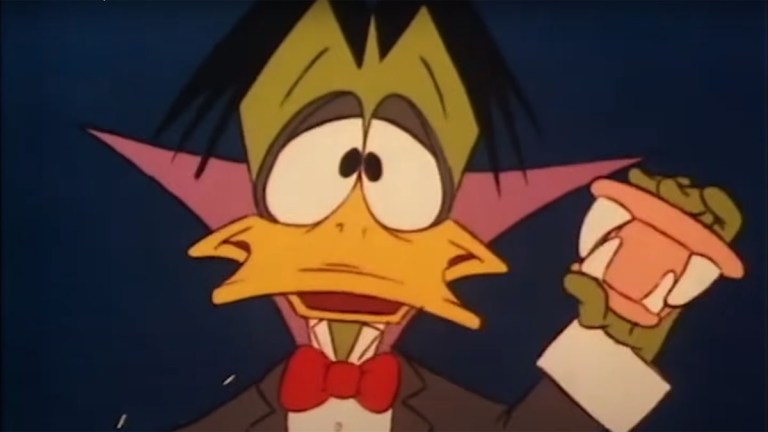30 Years Ago, the Brilliant Count Duckula Left a Vampire Duck-Shaped Hole in Kids’ TV
There's not a vampire zanier than... Duckula!

On the 16th of February 1993, Count Duckula bade its audience ‘Goodnight out there…whatever you are’ for the final time. For five years from 1988, Cosgrove Hall‘s creepy and clever animated kids’ show about a vegetarian vampire duck had dazzled audiences with its madcap mix of farce, physical comedy and witty word-play.
While never as broadly popular as Danger Mouse – the spoof spy caper out of which it was spun, and which also featured David Jason as the voice of its titular character – Count Duckula built a steadfast core of fans. To them, Count Duckula was The Rolling Stones to Danger Mouse‘s Beatles, a darker, edgier delight for those who prefer their cartoons with a little more bite. Whichever way you look at it, it’s hard to refute that they don’t make kids’ TV shows quite like Count Duckula anymore…
In the Heart of Transylvania
In a very real sense, of course, they literally don’t make them like this anymore. Each frame of Count Duckula‘s 65 episodes was painstakingly hand-drawn on animation cells, a technique that’s long since become almost obsolete. While those weaned on the seamlessly slick cartoons of today might describe Count Duckula‘s animation as clunky – it’s hard not to notice that the mouths of the characters move like those of ventriloquist’s dummies – the visual style is a perfect fit for the hammy, Gothic tone of both the setting and writing.
Plus, there’s something to be said for putting aside the make-it-snappy sensibilities of modern TV editing in favour of something slower and more evocative. Count Duckula often takes time to luxuriate in the show’s luscious, mood-setting stills, which feature all manner of beautifully bleak landscapes, including, of course, the menacingly lopsided Castle Duckula itself.
Count Duckula‘s writing and voice performances are an embarrassment of riches that eclipses any minor quibbles about aesthetics. Crucially, the show is very, very funny, in a way that rewards and respects the creativity and intelligence of its young audience by refusing to underestimate or talk down to them. Case in point: a significant proportion of the show’s jokes are about murder, mention of which is tossed around as casually as crumbs.
Duckula: “Last time you killed three chambermaids and a footman.”
Nanny: “Oh, they was only part time, sir. And the little blonde one never dusted the kitchen rails.”
In the Vampire Hall of Fame-Yeah
Count Duckula‘s premise is about an ancient bloodline of Transylvanian vampire ducks, whose male heir can be resurrected once every century with the aid of magic and bat blood. Each iteration of vampire duck remains distinct and separate from the one before, the only connection between them heredity and blood-lust. Until, that is, the normal process of resurrection is interrupted by the comic bungling of our titular count’s Nanny (Brian Trueman), who hands Duckula’s faithful manservant Igor (Jack May) a bottle of tomato ketchup instead of blood.
What emerges is not a cold-hearted, blood-sucking killer, but a slightly buffoonish, big-hearted egoist who would always be more inclined to ravage a packet of lettuce than an outstretched neck; a creature much more interested in fame than infamy. He wants to escape; cast off the shackles of the outdated system to which he finds himself hostage. Igor, Duckula’s world-weary and witheringly hilarious butler, is bound by ancient honour and duty to serve his master no matter how radical his requests, but misses few opportunities to steer his young charge back towards tradition. Nanny, the sweet, hulking galoot, just goes on loving them both – no matter what happens, or how many walls she has to smash through to prove it. Duckula’s nemesis, the Van Helsing-inspired Dr. Von Goosewing (Jimmy Hibbert), will always want to kill Duckula for the crimes of his ancestors, no matter how hard Duckula tries to convince the world that he’s a different kind of duck.
Most children’s TV shows keep things light and fluffy (they can’t all be Adventure Time) and, in the main, that’s probably for the best. Count Duckula’s secret is that it opens that door to adult jokes just wide enough to mark it out as something different and daring, but not anywhere near wide enough to tip over into obscenity. It’s sometimes risqué, but never rude, as is apparent in the Carry-On-esque title of one of its early episodes: ‘No Sax Please We’re Egyptian’.
Things Never Run to Plan for Duckula
The show’s biggest laughs come from the tension that exists between the competing rivalries of tradition and modernity; conformity and rebellion. You can’t say that! But why not?! This is the way we’ve always done things. But what if I want to do something else? These questions, which swirl around Count Duckula‘s core, lend the show a maturity that you wouldn’t necessarily detect elsewhere. In real life, the answers to these questions aren’t always uplifting – sometimes they’re unbearably sad – and it’s a credit to Count Duckula that it never patronises its young viewers by attempting to conceal from them life’s crushing bleakness and endless frustrations. Because it trusts them. And because that shit’s funny.
Nowhere is the show’s central tragedy more apparent than in this exchange between the count and Igor:
“I’ve taken all I can stand. I’m closing the place down and getting a proper job.”
“Might I ask what, m’lord?”
“Certainly. As a, as a…Well, don’t you worry, I’ll think of something.”
Is Count Duckula really trapped, or is he just too frightened to go out into the world? Does he actually – when it all comes down to it – need these people a lot more than they need him? Is he Prince Harry?
This dynamic sets the show firmly in the tradition of that great British sitcom trope of seeing what happens when a bunch of oddball characters who despise each other are trapped together somewhere for what may as well be an eternity (and which in Count Duckula’s case probably is). Will the ‘main’ character’s aspirations be realised or will they be thwarted? Will they all learn to love each other, or kill each other in the process? The answer is usually somewhere in between, and that’s true whether the characters are trapped in deep space, as in Red Dwarf, or trapped inside the equally suffocating airless wasteland of the family, as in Steptoe & Son, Absolutely Fabulous or Only Fools and Horses (also starring David Jason).
[As a brief aside to the Red Dwarf comparison, the mad scientist villain in the final episode of Count Duckula sports a malevolent hand-puppet that’s eerily similar to Mr Flibble. Red Dwarf‘s Quarantine episode debuted less than a year earlier.]
You Can Always Count Upon…
While the show deliberately styles itself on the Gothic melodrama of Vincent Price movies (referenced in Barry Clayton’s excellent parody voiceover), it arguably shares as much DNA with long-standing sci-fi classic Doctor Who.
Both shows have a title character who has existed in many different forms across the centuries, coming back to life again and again in an unbroken chain of contiguous but unique incarnations. Both characters stand in opposition to the rigidity of their respective peoples and lineages. Both travel in a device they also call home: in the Doctor’s case, the TARDIS; in Duckula’s case, his castle, which also possesses the ability to travel anywhere in space and time (and – also like the TARDIS – frequently fails). There may even be grounds to start a rumour that Duckula’s hair-style, bow-tie, flappy manner, and propensity for playing mouth instruments is a nod to Patrick Troughton‘s incarnation of the Doctor.
And that’s before we go even further down the rabbit hole and start drawing comparisons between Igor and The Hitchhiker’s Guide to the Galaxy’s Marvin the Paranoid Android.
Given those influences, it’s no surprise that Count Duckula feels British to its core, which is remarkable considering its American-accented lead, Nickelodeon co-production, Looney Tunes-style slapstick comedy and witticisms that wouldn’t feel out of place in a Woody Allen movie.
All of which goes to say that, even three decades after it ended, if you’re looking for some fun you can always count upon the wild and wacky one they call Duckula.
